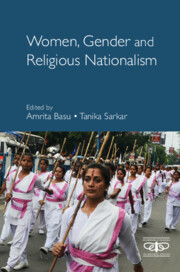Book contents
- Frontmatter
- Dedication
- Contents
- List of Abbreviations
- Introduction: Women of Hindu Rashtra
- Part I Changing Modalities of Hindu Nationalist Organizing
- Part II Gendered Techniques of Mobilization: The Sangh and the Samiti
- Part III Cultivating Women’s Militancy: The Vishva Hindu Parishad
- Part IV Refashioning Gender and Sexuality
- Part V Alternative Activist Responses to the Hindu Right
- Glossary
- About the Contributors
- Index
7 - Tracing the Rise of Ascetic Masculinity in India
Published online by Cambridge University Press: 12 August 2022
- Frontmatter
- Dedication
- Contents
- List of Abbreviations
- Introduction: Women of Hindu Rashtra
- Part I Changing Modalities of Hindu Nationalist Organizing
- Part II Gendered Techniques of Mobilization: The Sangh and the Samiti
- Part III Cultivating Women’s Militancy: The Vishva Hindu Parishad
- Part IV Refashioning Gender and Sexuality
- Part V Alternative Activist Responses to the Hindu Right
- Glossary
- About the Contributors
- Index
Summary
Introduction
Religious ideas have played – and as this chapter will show, continue to play – a central role in Indian politics, and these ideas are gendered in nature. Some of these take a particular masculine form – violent, heterosexual and upper caste – and it finds expression in the political sphere through physical as well as symbolic forms of violence. One such form of masculinity gaining political capital is ascetic masculinity. I demonstrate in this chapter that the manifestation of ascetic masculinity traced in the works of Vivekananda, Golwalkar and Gandhi continue to be present and influence politics in India. A politics of appropriation in the contemporary Indian politics has seen right-wing Hindutva organizations applauding Gandhi and Vivekananda often. There is a growing trend within the Bharatiya Janata Party (BJP) to celebrate both Gandhi and his assassin, Nathuram Godse (Mukherjee 2019). This chapter will look at how ascetic aspects of the works of Vivekananda and Gandhi are taken out of context and appropriated by the RSS–BJP that helps them correlate their ideas of asceticism with that of Golwalkar, and how that appropriation is serving their violent masculinist tendencies.
The practices of violent masculinism in Indian politics in the early twentieth century bear resemblance to the political masculinity in contemporary India. This violent masculinism derives its strength from other structural hierarchies such as casteism. The need of the hour is to understand gender relations in their totality – the whole spectrum of manhood, womanhood, sexes, sexualities and their interconnections with our social spheres of culture, politics and religion. In fact, in either responding to a sociopolitical moment or attempting to re-enact a particular sociopolitical situation, the formation of hegemonic masculinity can be of use to bring back historical memories and past imaginings into present use. As Anand (2009) observes:
The sexual dimension of the Hindutva discourse, as revealed in the jokes, slogans, gossip, and conversations of young male activists, is relevant … it assures the Hindu nationalist self of its moral superiority and yet instils an anxiety about the threatening masculine Other.
In the performance of Hindu masculinity, the spheres of politics and religion continually intersect. The self-identity manifested by the state is that of a father figure – heterosexual, Hindu and patriarchal. This chapter will interrogate this Hindu masculine identity and how violent ascetic masculinity plays a role in its creation based on Islamophobia since the nineteenth century.
- Type
- Chapter
- Information
- Women, Gender and Religious Nationalism , pp. 195 - 223Publisher: Cambridge University PressPrint publication year: 2022



